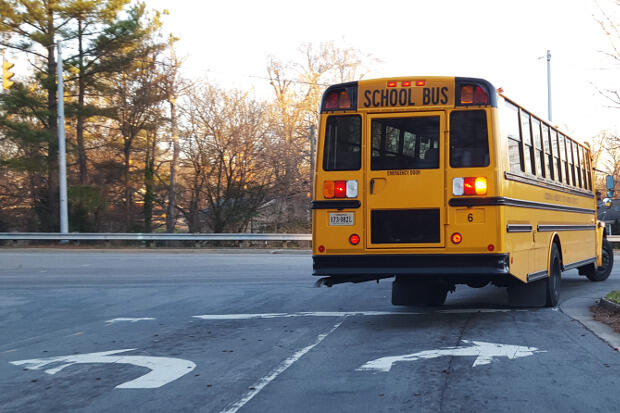
Jan. 11, 2016
Majorities say current school funding is insufficient, would pay more in taxes to increase support
Share this story
CONTACT:
Robyn McDougle, Ph.D.
Interim Executive Director
Commonwealth Educational Policy Institute
Phone: 804-827-3290
Email: rdmcdougle@vcu.eduOR
Farrah Stone Graham, Ph.D.
Survey Director
Phone: 804-828-1989
Cell: 804-305-3447
Email: stonefn@vcu.edu
While legislators prepare to take up a budget proposal from the governor that contains significant increases in funding for education, a recent poll by the Commonwealth Educational Policy Institute at Virginia Commonwealth University shows that Virginians strongly support increased funding for public schools and see it as having a direct impact on school quality.
More than two-thirds of Virginians (67 percent) say that Virginia schools do not have enough funds to meet their needs, while only 25 percent say schools have enough funding now. More than seven in 10 respondents (71 percent) said that the amount of funding affects education quality a great deal or quite a lot. Additionally, most Virginians (56 percent) would be willing to contribute more in taxes to increase money for schools, while 40 percent say they are not willing to do so. A willingness to pay more in taxes grows to 63 percent for additional funding targeted to high-poverty, low-performing schools that are working to increase student performance.
This data suggests lawmakers have public backing to grow resources for education, especially if it’s targeted to low-performing areas.
The proportion willing to pay higher taxes for overall education funding is 3 percentage points higher than last year but a partisan breakdown of support shows 66 percent of Democrats willing to see taxes increased, compared to only 48 percent of Republicans and 43 percent of independents. For funding targeted to high-poverty, low-performing schools, the breakdown is similar, with support from 76 percent of Democrats, 51 percent of Republicans and 57 percent of independents.
“This data suggests lawmakers have public backing to grow resources for education, especially if it’s targeted to low-performing areas,” said Robyn McDougle, Ph.D., interim executive director of the Commonwealth Educational Policy Institute and associate professor at the L. Douglas Wilder School of Government and Public Affairs at VCU.
“At the same time, the poll shows it's likely that legislators will hear different feedback from their constituents on taxes as a way to pay for that growth, depending on their political party.”
Lawmakers looking to pull funds from other programs to support education will likely leave funding for mental health services untouched if public opinion is any guide. According to the poll, that area of state government is the only one that Virginians see as a higher priority than public school funding.
More than seven in 10 respondents (72 percent) said they would be willing to pay more in taxes to keep public schools funded at the current level and 76 percent said the same regarding mental health services. Compared to the previous year, willingness to support programs for aid to low-income families increased 6 percentage points to 62 percent and support for transportation grew 8 percentage points to 54 percent. Willingness to support higher education (50 percent) and prisons (27 percent) was statistically unchanged.
Though there was significant variation along partisan lines, a majority of Democrats and Republicans would support higher taxes to keep funding levels stable for mental health services, public schools, aid to low-income families and transportation. Conversely, Republican willingness to support higher education was only 34 percent while Democratic support was 62 percent.
“Given these insights into public priorities, those advocating for increased spending on higher education or prisons will likely face more of an uphill battle to win significant gains,” McDougle said.
Recent actions to reduce the number of standardized tests also appear in line with public opinion. More than three-quarters of Virginians (80 percent) agree that preparations for SOL testing take so much class time that teachers cannot cover all of the important material and a strong majority (67 percent) agree that SOL tests are putting too much pressure on students.
Most Virginians (58 percent) disagree with the statement that SOLs help improve student achievement. However, a narrow majority overall (55 percent) see a benefit of the SOLs in holding schools accountable and a similar proportion (53 percent) think SOLs make sure that all students in Virginia meet the same academic standards.
Other findings of the newly released poll include:
- Seventy-nine percent of respondents feel their community’s schools were safe or very safe, with 25 percent saying they were very safe.
- Fifty-six percent prefer additional security measures be used to address school safety issues while 27 percent preferred addressing school safety issues through the mental health system.
- Sixty-one percent of respondents support using more state funds to make sure that parents with limited English proficiency have access to information about their child’s education in a language they understand.
These findings are part of a new statewide survey conducted by VCU. The Commonwealth Education Poll was conducted by landline and cell telephone from Dec. 15-20, 2015, with a random sample of 801 adults in Virginia. The margin of error for the poll is plus or minus 4.2 percentage points. This poll is conducted annually by VCU’s Commonwealth Educational Policy Institute (CEPI), which is part of the L. Douglas Wilder School of Government and Public Affairs. Portions of the poll related to higher education and workforce development will be released on Mon., Jan. 18.
For a PDF of the 39-page report including complete question wording and detailed tables of results see http://cepi.vcu.edu/publications/polls/.
Subscribe to VCU News
Subscribe to VCU News at newsletter.vcu.edu and receive a selection of stories, videos, photos, news clips and event listings in your inbox.










